50 Windows 10 Keyboard Shortcuts You Should Know in 2019
[the_ad id='1307']
Windows 10 has come a long way in terms of features, performance, and overall stability. However if you want to take full advantage of Windows 10 you need to learn inbuilt keyboard shortcuts which can improve your workflow efficiently. The Windows 10 keyboard shortcuts are great and provide a number of crucial ways which can save you time and a lot of laborious clicks. In this article, we are going to share all the useful Windows 10 keyboard shortcuts including some new and interesting ones. So having said, let us begin with the best Windows 10 keyboard shortcuts you should be using right now.
Best Windows 10 Keyboard Shortcuts
In this article, we are going to learn all kinds of Windows 10 keyboard shortcuts. First, we will begin with some new keyboard shortcuts which are quite interesting and can improve your workflow. After that, we will go through all the commonly used keyboard shortcuts so that you can breeze through Windows 10 efficiently. Having said that, let’s begin with the list of best Windows 10 keyboard shortcuts.
New and Interesting Windows 10 Keyboard Shortcuts
1. Open Emoji Keyboard
Shortcut Key: Windows + . (the period key)
If you want to insert an emoji, just press Windows and period keys at once and the emoji keyboard will instantly open up. The best part is that it seamlessly integrates with the text field. Enjoy!
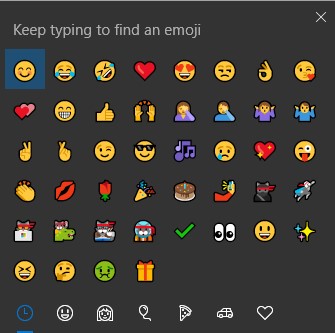
2. Access Clipboard History
Shortcut Key: Windows + V
Finally, Microsoft brought Clipboard History in the latest version of Windows 10. Now you can go through all your copied texts with this simple shortcut.
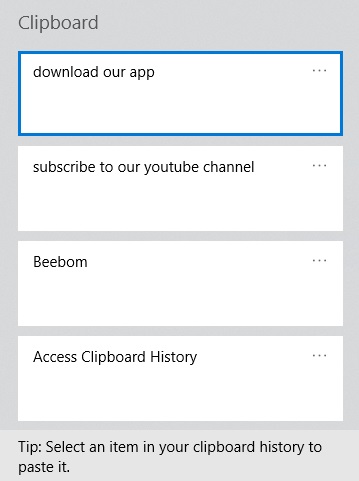
3. Reset Display Driver
Shortcut Key: Ctrl + Windows + Shift + B
This shortcut is going to save you when your PC freezes due to GPU issues. Just hit this shortcut and instantly the display driver will reset itself saving you from unsaved work.
4. Quickly Open a Program as an Administrator
Shortcut Key: Ctrl + Shift + Click on Taskbar Program
You want to open a program quickly with Administrator privileges? No worries. Just use this simple shortcut and you will be prompted with the UAC dialog. Click on Yes and there you have it.
5. Quickly Connect Accessories
Shortcut Key: Windows + K
Windows 10 has brought this amazing shortcut which lets you discover and connect wireless display and audio devices swiftly. Use this shortcut if you use multiple accessories.
6. Quickly Switch to Different Windows of a Program
Shortcut Key: Ctrl + Click on Grouped Programs on Taskbar
This shortcut is seriously for multitaskers. If you want to efficiently wade through multiple active windows of an app, just use this shortcut and you will be on the run.
7. Open Advanced Windows Tools
Shortcut Key: Windows + X
If you are someone who wants to quickly uninstall programs, open PowerShell with Admin rights or update drivers from Device Manager, this shortcut will save you a lot of clicks. If you are a pro user, this one is for you.
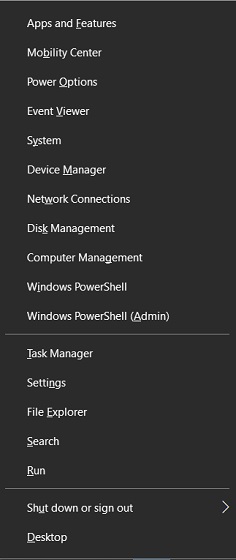
8. Open Action Center
Shortcut Key: Windows + A
You want to quickly check notifications on your Windows PC? Just press Windows and A keys and voila, you can go through all your notifications in Action Center.
9. Snap Window
Shortcut Key: Windows + Left/Right/Up/Down Arrow
Windows has made it easier to multi-task in a breeze. Just press Windows and Left or Right arrow key to snap the current window to either side. You can also use the Up or Down arrow key to maximize and minimize the current window.
10. Take a Selectable Screenshot
Shortcut Key: Windows + Shift + S
If you want to take a screenshot of part of your screen then this shortcut can help you do it. The Windows + Print Screen shortcut is great but you can’t select your content window and you have to further edit it. So just use this shortcut and save yourself from further hassle.
11. Summon Cortana
Shortcut Key: Windows + C
You can easily talk to Cortana by using this simple shortcut. No need to manually click on the Cortana button. The good thing is that the moment you trigger this shortcut, Cortana is ready to listen to your commands.
Note: This shortcut is turned off by default. To turn it on, go to Windows Settings-> Cortana -> Enable Keyboard Shortcut.
12. Open Windows Settings
Shortcut Key: Windows + I
If you want to quickly jump to Windows Settings, this shortcut can make things way easier for you. Just press Windows and I keys from anywhere and you are already on Windows Settings.
13. Record Your Gaming Session
Shortcut Key: Windows + Alt + R
If you are a gamer, this shortcut is for you. Whenever you are playing a game, just press this key combination and Windows will start recording your gameplay with microphone audio synced in. Amazing, right?
14. Redo an Action
Shortcut Key: Ctrl + Y
If you are looking to redo what you undid, there is this simple shortcut to restore your action. Nice wordplay, eh?
15. Create a New Folder
Shortcut Key: Ctrl + Shift + N
This is a really handy shortcut if you deal with local folders regularly. I love this shortcut because it makes my workflow easier and faster. The window menu is too late to show up so this one saves my day.
16. Paste Without Formatting
Shortcut Key: Ctrl + Shift + V
You paste some text in your word processor and it has weird formatting? No worries. Use this shortcut and it will paste without any formatting.
1. Lock Your PC or Switch to a Different Account
Shortcut Key: Windows + L
This shortcut is pretty helpful to quickly lock down your PC from unauthorized access. You can also switch to a different account from the sign-in screen.
2. Project Your Screen or Change the Display Mode
Shortcut Key: Windows + P
If you use multiple monitors, this shortcut can make the transition a lot faster and easier. With this shortcut, you can extend your display or mirror it on another monitor.
3. Open Run Window
Shortcut Key: Windows + R
This is a widely known shortcut to open the Run command window. From here, you can access a number of programs by their target names.
4. Show Desktop
Shortcut Key: Windows + D
You can use this shortcut to minimize all the open windows and get back to the Desktop environment. It comes in handy when you want to quickly open a program or file from the Desktop.
5. Quickly Check Calendar
Shortcut Key: Windows + Alt + D
Windows 10 has this new shortcut which lets you check Calendar without jumping through hoops. Users were requesting for this shortcut for a long time and Microsoft has brought it. Rejoice!
6. Peek at the Desktop
Shortcut Key: Windows + , (Comma key)
If you use sticky notes on Windows 10 to jot down things, this shortcut can help you take a look at your desktop without minimizing anything. Just press Windows and Comma key and you can get a peek of your Desktop. Release the buttons and you are back to your active window.
File Explorer Keyboard Shortcuts
1. Open File Explorer
Shortcut Key: Windows + E
You can directly open File Explorer without moving to Desktop and opening “This PC”. This shortcut helps me quickly find files and folders without losing any moment. You can use this shortcut to improve your workflow.
2. Search File Explorer
Shortcut Key: Ctrl + F
You want to quickly search files without touching the mouse? Just press Windows and F keys in File Explorer and you will be ready to enter your search query.
3. Go Back to the Previous Folder
Shortcut Key: Backspace
Backspace is the easiest way to navigate the Windows file system. If you are in a folder and want to go back, just press the backspace key and you will be in the parent directory. You can also use the Arrow keys to move the cursor and Enter key to open any file or folder.
4. Preview an Image
Shortcut Key: Alt + P
If you want to preview an image without opening it, you can use this shortcut. It’s really helpful and saves a lot of time.
5. Open Properties
Shortcut Key: Alt + Enter
You can use this shortcut to quickly open the Properties dialog box. Just select the file/folder and press Alt and Enter keys. The dialog box will appear instantly.
6. Change the Icon Size of Files and Folders
Shortcut Key: Ctrl + Mouse Scroll Wheel
If you want to change the icon size without touching the View panel, this shortcut is the fastest way to do it. Just press and hold the Ctrl key and scroll the mouse wheel. There you have it.
Taskbar Keyboard Shortcuts
1. Open a Duplicate Program
Shortcut Key: Shift + Click on Taskbar Program
If you want to open another instance of an active program, you can achieve it through this shortcut. Press the Shift key and click on any Taskbar program. A duplicate window of the same app will open up.
2. Quickly Open Pinned Taskbar App
Shortcut Key: Windows + Number based on the position of the App
If you want to quickly open pinned apps on your Taskbar, you can do so by pressing the Windows key and the number at which they are positioned. This shortcut makes it really easy to access programs without leaving the keyboard.
3. Cycle Through Different Apps on Taskbar
Shortcut Key: Windows + T
If you find the above shortcut overwhelming with its numbering scheme, you can use this shortcut to open Taskbar apps on the fly. It lets you cycle through all the apps pinned on your Taskbar and you can open it with the Enter key.
Virtual Desktop Keyboard Shortcuts
1. Open Task View
Shortcut Key: Windows + Tab
This shortcut can really improve your workflow if you regularly use Virtual Desktop on Windows 10. Besides, you can also access your activities from other devices in the Task View window.
2. Add a New Virtual Desktop
Shortcut Key: Windows + Ctrl + D
Adding a new virtual desktop through Task View is really laborious on Windows 10. Instead of that, you can use this simple shortcut to create a new Virtual Desktop without wasting any time.
3. Switch Between Virtual Desktops
Shortcut Key: Windows + Ctrl + Left/Right Arrow
Again, wade through the clutter of multiple windows and Virtual Desktops through this shortcut. It’s a breeze to switch between Virtual Desktops using this shortcut.
4. Close Current Virtual Desktop
Shortcut Key: Windows + Ctrl + F4
You can close the active Virtual Desktop without jumping through hoops. Just use this shortcut and you are done with it.
Windows Terminal and Command Prompt Shortcuts
In the latest version of Windows 10, Microsoft has removed all the limitations of command-line editing on both Command Prompt and the recently launched, Windows Terminal. You can use the standard text editing shortcuts to copy, paste and edit right into the Terminal window.
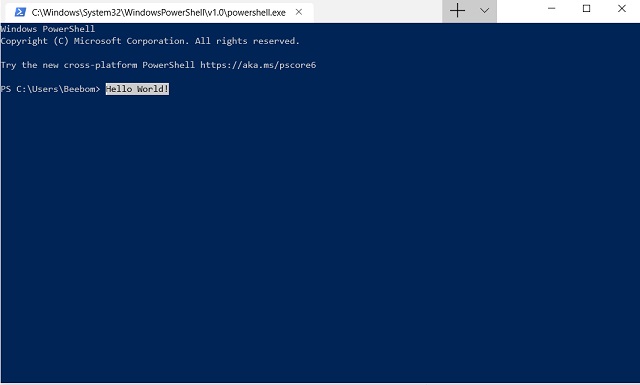
1. Copy and Paste Commands
Shortcut Key: Ctrl + C and Ctrl + V
2. Select All Texts in the Terminal Window
Shortcut Key: Ctrl + A
3. Select Block of Texts in the Terminal Window
Shortcut Key: Shift + Left/Right Arrow Keys
Accessibility Keyboard Shortcuts
1. Enable Sticky Keys
Shortcut Key: Press the Shift key five times continuously
Sticky Keys are pretty helpful if you are unable to press the modifier (Ctrl, Alt, Windows key, Fn) and other key combination simultaneously. With Sticky Keys enabled, you can press the modifier key and have it remain active until other keys are pressed. Generally, this feature is to assist users with physical disabilities.
2. Quickly Open Ease of Use Settings
Shortcut Key: Windows + U
You can open Ease of Use Settings page just by pressing Windows and U keys. From here, you can adjust text size, color, brightness and a lot more.
3. Open Magnifier
Shortcut Key: Windows + Plus key (+)
This shortcut is the easiest way to open Magnifier on Windows 10. All you have to do is press Windows and Plus keys at once and the Magnifier will open up instantly.
4. Start Dictation
Shortcut Key: Windows + H
You can use this shortcut to type with your voice. If you are in a text field, it lets you dictate seamlessly. This feature is really good and should be used more often.
5. Enable the Narrator
Shortcut Key: Ctrl + Windows + Enter
The Narrator on Windows 10 can read aloud texts from the screen. You can also select the content window from where it will read and relay the information to you. This feature can help visually impaired users.
Basic Windows 10 Keyboard Shortcuts
Here, we have included the most basic Windows 10 keyboard shortcuts which are commonly used. If you are new to the Windows ecosystem, you can go through this section and get acquainted with the basics.
1. Copy, Cut and Paste
Shortcut Key: Ctrl + C, Ctrl + X and Ctrl + V
2. Select All
Shortcut Key: Ctrl + A
3. Switch Between Open Apps
Shortcut Key: Alt + Tab
4. Select a Block of Text
Shortcut Key: Shift + Left/Right/Up/Down Arrow Key
5. Undo an Action
Shortcut Key: Ctrl + Z
6. Move the Cursor to the Beginning of Text
Shortcut Key: Ctrl + Left/Right Arrow Key
7. Close Current Window
Shortcut Key: Alt + F4
8. Refresh the Current Window
Shortcut Key: F5
9. Delete Without Moving to Recycle Bin
Shortcut Key: Shift + Delete
10. Open Task Manager
Shortcut Key: Ctrl + Shift + Esc
Customize Windows 10 Keyboard Shortcuts
In the above sections, we talked about the predefined keyboard shortcuts that ships with Windows 10. But what if we can customize the keyboard shortcuts to our preference? Well, here I am going to share two easy ways to personalize Windows 10 Keyboard shortcuts. So without further ado, let’s begin with the native method first.
Customize Keyboard Shortcuts with Native Settings
With the native way, you can assign your preferred keyboard shortcut for various apps. Whenever you press the assigned key combination, the specific app will open up. To assign shortcut keys, follow these steps.
1. Right-click on an app of your choice and open “Properties”.
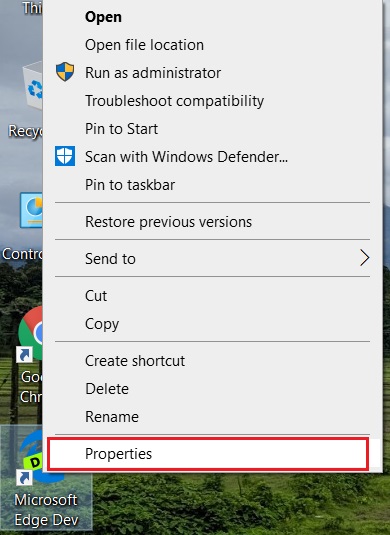
2. You will find “Shortcut Key” in the Properties dialog. In the corresponding text field, press your choice of key combination and hit the “Ok” button.
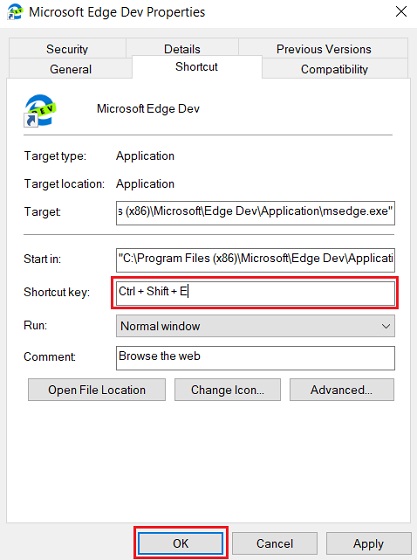
3. That’s it. Now whenever you will trigger the said keyboard shortcut, the assigned app will open up.
Customize Keyboard Shortcuts with WinHotKey
WinHotKey is a third-party app which lets you create system-wide hotkeys. It basically means that you can create a shortcut which can trigger an action from any app or environment. WinHotKey lets you create multiple keyboard shortcuts to launch applications, open a document, folder or quickly type some text in the background. You can use various combinations of Ctrl, Alt, Shift, Windows, numbers, and letters to create a unique shortcut key. Overall, it’s a powerhouse of an app. If you want to dive deep and customize Windows 10 keyboard shortcuts at length, WinHotKey is highly recommended.
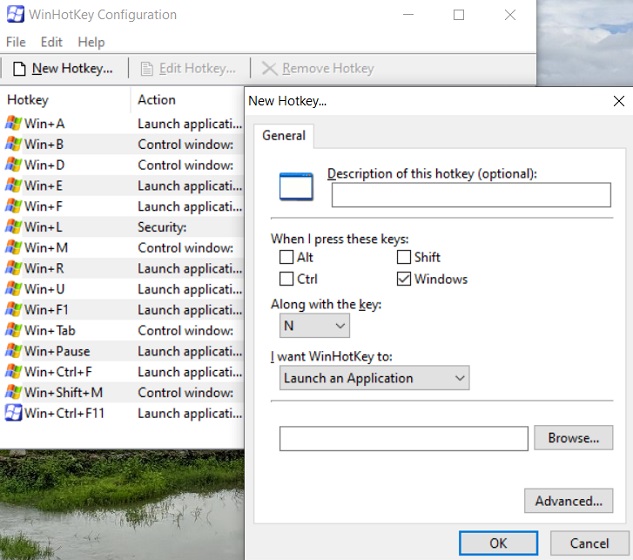
Download WinHotKey (Free)
SEE ALSO: 18 Beginner Tips for Windows 10
Familiarize with the New Windows 10 Keyboard Shortcuts
So that is a complete list of all the useful Windows 10 keyboard shortcuts that you should be using right now. In order to improve your workflow significantly, it’s important to inculcate the keyboard shortcuts. It just makes things a breeze. Also, if you want to create your own keyboard shortcuts, you can do that too. Just follow the guide in the above section. So that will be all from our side. If you use some interesting Windows 10 keyboard shortcuts that we missed in this article, do let us know in the comment section below. We will be happy to take a look.
[the_ad id='1307']
Source link
[the_ad id='1307']